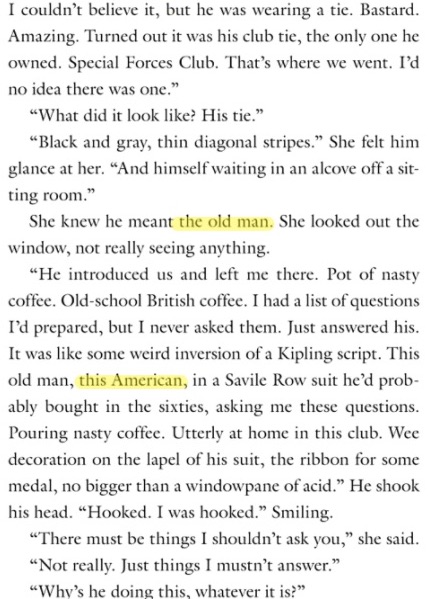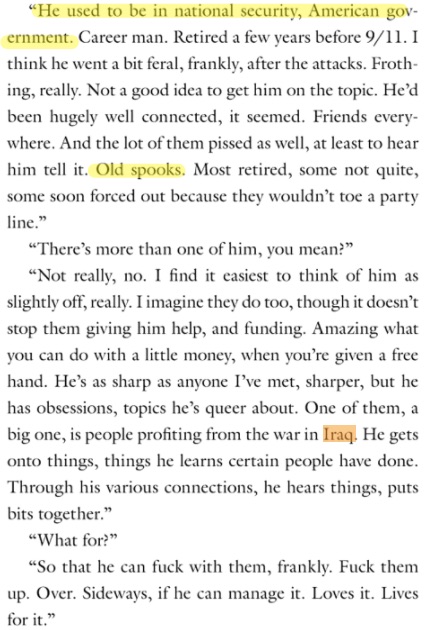By Lambert Strether of Corrente
I was reading Consortium News’s reconstruction of Dominic Cummings’ horrid, prehensile clambering up the greasy pole of Tory Inner Party politics to become BoJo’s Chief adviser (“What Made Dominic Cummings Dash to Durham?“), when I came across this astonishing passage (I’ve helpfully lettered the gobsmacking bits in square brackets):
As to the sort of persons whom Cummings says he wants to recruit into government in place of those he wants to sack, he has described them in a post on his personal blog.
As well as the usual emphasis on mathematics and science graduates, the post invites applications from:
“Super-talented weirdos.
People in SW1 talk a lot about ‘diversity’ but they rarely mean ‘true cognitive diversity’. They are usually babbling about ‘gender identity diversity blah blah’. What SW1 needs is not more drivel about ‘identity’ and ‘diversity’ from Oxbridge humanities graduates but more genuine cognitive diversity.
We need some true wild cards, artists, people who never went to university and fought their way out of an appalling hell hole, weirdos from William Gibson novels like [A]that girl hired by Bigend as a brand ‘diviner’ who feels sick at the sight of Tommy Hilfiger or [B]that Chinese-Cuban free runner from a crime family hired by the KGB. If you want to figure out what characters around Putin might do, or how international criminal gangs might exploit holes in our border security, you don’t want more Oxbridge English graduates who chat about Lacan at dinner parties with TV producers and spread fake news about fake news.”
The comments about “Oxbridge humanities graduates” and “Oxbridge English graduates who chat about Lacan at dinner parties with TV producers” come across as rather odd, especially coming from Cummings, who is himself an Oxford humanities graduate.
Now, to be fair to Cummings, he does not explicitly claim that he’s read either of the two William Gibson novels to which he refers ([A], Pattern Recognition, and [B] Spook Country). However, when Cummings writes “that girl hired by [Belgian advertising mogul Hubertus] Bigend,” as if both he and the reader share an easy familiarity with the character, I think even this humble blogger — and former humanities major, although not at an exalted venue like Oxford — is entitled to infer that Cummings has done the reading. Except he hasn’t. In case [A], “that girl,” Cummings merely displays laziness. In case [B], “hired by the KGB.” he goes grotesquely astray. Case [A] depends on close reading. Case [B] is open and shut. Let’s take each case in turn.
Cayce Pollard, in Pattern Recognition, is “that girl”. Cummings writes:
… that girl hired by Bigend as a brand ‘diviner‘…
Cummings surrounds the word “diviner” with single quotation marks, implying that’s how Gibson describes her job in his text (University of Oxford Style Guide, page 16: “Use single quotation marks for direct speech or a quote”). Unfortunately, the word “diviner” appears nowhere in the book. Google books:

And, for that matter, Amazon:

Worse, Cummings’ little fabrication misrepresents Pollard’s talent, as described by Gibson and understood by Cayce and Bigend. Divination, what Cummings’ “diviner” does, is defined by Shorter Oxford English Dictionary as follows:
1. The action or practice of divining; an act of divining; insight into or discovery of the unknown or the future by supernatural or magical means; (an) augury, (a) prophecy.
2. Guessing by happy instinct or unusual insight; successful conjecture; an inspired insight, a skilful forecast, a good guess.
For sense 1, there is nothing supernatural about Pollard’s talent; for sense 2, Bigend has hired Pollard to pronounce on a corporate logo. He is not hiring her to guess; he is hiring her because she will know. Gibson describes, obliquely, Pollard’s talent and process at the start of the book (pages 10-14 in my paperback):
The new logo will be this firm’s pivot into the new century, and Cayce, with her marketable allergy, has been brought over [to Bigend’s London office] to do in person the thing that she does best…. Doreatea [representing Bigend’s client] removes an eleven=inch square of art board from the envelope [and] displays it to Cayce.
“No,” [Cayce] says.
Cayce’s contract for a consulation of this sort specifies that she absolutely not be asked to critique anything…. She is there only as a very specialized piece of human litmus paper.
“It must be difficult,” [Bigend’s representative Bernard] Stonestreet says…. “when you don’t like something. Emotionally, I mean.”
“It isn’t about liking anything, Bernard,” Cayce say… “It’s like that roll of carpet, there; it’s either blue or it’s not. Whether or not its blue isn’t something I have an emotional investment in.”
Needless to say, this is not divination; there’s nothing of the divine about it. Even if one wished to force the issue and compare Cayce’s pronouncements to, say, dowsing, no dowser would ever describe their talent as an allergy.[1]
Now, let’s turn to case [B]. Cummings writes:
…. that Chinese-Cuban [sic] free runner from a crime family hired by the KGB
Tito, the “Cuban-Chinese” (Gibson’s ordering throughout) free-runner, is most definitely not hired by the KGB, or — Gibson’s novel being set in the very near future, and the Soviet Union having been dissolved in 1991, the KGB along with it — any organ of Russian state security. Tito has been hired by an American, “The Old Man,” a retired American intelligence agent. Gibson’s plotting is too complex for me to excerpt or explain, so I’ll just show Tito working for Old Man in the operation that drives the book. Page 250 (Amazon):

And now I’ll show that the Old Man is American (page 413):

And that the Old Man is a spook from the intelligence community (page 414):

So, as you can see, Tito has been hired by a protagonist who is about as far from “the KGB” as it’s possible to be. Cummings cannot have read — or, to be fair, have finished — the book.
Now, I will concede there’s some room for judgment in Case [A], since — leaving aside the issue of Cumming’s quoting material that doesn’t actually appear — my interpretation is based on a close reading of the text. Not very much room, but some. But for Case [B], there’s no room for judgment at all. Cummings has made a grotesque error. My question: Why?
The passage excerpted comes, after all, from what is in essence a Help Wanted advertisement. Cummings is trying to recruit people into government, his party’s government. One would think Cummings would be writing very carefully. Two explanations come to mind:
(1) Cummings is writing as well as he can. He is lazy and ignorant, hasn’t done the reading, and by the Dunning-Kruger syndome, doesn’t know what he is. So he picked up a few taglines from a Spectator review, say, and plugged them into his deliverable, assuming nobody would call him on his effort to appear more “cognitively diverse” than he really is. Cummings has form; this explanation is consistent with it.
(2) Cummings introduced the errors deliberately. He is psychotic and devious. He doesn’t want a candidate who will point out the errors; he wants a candidate who will not: A sycophant and a yes-man-person. This too, is consisent with Cummings’ past form.
Who can say?
NOTES
[1] To be fair once more to Cummings, Gibson’s usual envoi includes this passage (page 366). Of Pollard’s “allergy” to logos: “Even the Michelin Man now registers as neutral. She wonders whether this change, whatever it is, will affect her ability to know whether or not a given trademark will work.” So one could work up various theories for why Pollard’s talent is supernatural — a product of her unresolved relation with her dead but oddly communicative father figure, for example. But that’s not how Pollard or Bigend think of it.


Not a fan of Gibson (dodges a hail of bricks along with a “So Why The F are you commenting?”)…
For example in the real world that supposed “Cayce” character is just every marketing person ever.
Cayce’s contract for a consulation of this sort specifies that she absolutely not be asked to critique anything
We call it “bring me another rock” syndrome. So them a rock, they don’t like it but can’t qualify why exactly so we have to bring another one. It’s not in their contract but doesn’t have to be as everybody is used to it.
Sheesh.
Strether himself seems to be a fan with qualifications. He likes what Gibson can do with characterization, but doesn’t like much of his reactionary politics.
I also think Gibson is a brilliant stylist, or at least was until Agency.
This is perhaps unfair but based on the excerpted passages above, I can’t say I agree. Indeed it seems to have that familiar style that weighs down so much anglophone literature written since, say, the 1950s: anglin’ for a film adaptation
I’ll suggest that you have the cause and effect reversed. {Slow fade out…}
I couldn’t get into Agency at all, but I loved the Bigend trilogy.
If Cummings wants to make a government out of fictional characters why settle with boring ones like these? Why not try to get the freakin’ genie from Aladdin? He gives three wishes, and he’s just as real.
If I could choose I’d take the djinn from the original tale.
Is not as funny and not recorded as doing musical numbers, but he has the distinct advantage of granting unlimited wishes as long as you have the lamp.
Disney mixed the story of Aladdin with that of the fisherman who found a BOTTLE with a different djinn inside, and that was the one granting only 3 wishes specifically.
Well, after at first wanting to kill him and then being tricked back into the bottle with the ole “I don’t believe a big guy like you ever fit into that tiny, little bottle” ploy.
I thought those characters were super-interesting and memorable. I’ve thought about Cayce Pollard many times since I read that book, and the parts about the Cuban-Chinese gang sent me to Wikipedia to discover, amazed, that a lot of what Gibson wrote about wasn’t made up.
Well, there was Wifredo Lam…
https://en.wikipedia.org/wiki/Wifredo_Lam
Bravo, just, bravo.
Here here. Let’s just calm down and remind ourselves that this is what the British public want. They very heartily voted for this. So relax and watch the show.
Bollox. (It is not a star in the constellation of Gemini, more properly a star in the constellation of Hercules; [the Disney Hercules, all Mickey Mouse.])
What did I just read?
Oh, please. The Guardian kept itself gainfully employed for a whole week with this kind of thing, until Black Lives Matter did us all a favour and was wheeled onto the stage in front of an eager audience. At least here Lambert does it properly.
And I’m sure you can find Cummings’ Downing Street press conference on YouTube or somewhere. Its worth watching because, if you think Lambert’s piece was slightly surreal, you should see the real thing. Cummings was like a child of mediocre abilities whose pushy parents had, perhaps not using the best judgement ever, entered him into a Spelling Bee. Cummings got through the first round with “dog” as his test word. He’d then breezed through the second round, correctly managing to spell “corn”. He was into his stride with “water”. But then the judges threw him a curved ball with “banana”. Cummings started off okay (“ban…”). He then got a pained and anguished look on his face before rallying (“a…”).
Then, unfortunately, he got totally carried away with himself and launched into an unstoppable “na… na… na… na…”) and carried on for several tortured minutes. “na… na… na… na…”. Eventually, he read the room and the aghast looks he was getting and stuttered to a halt. But he looked very pleased with himself.
Yes, that’s what our media is reduced to, these days. A supposed propaganda Svengali-esque genius who can’t even dress presentably and lie half-decently… I don’t know what the world is coming to.
Yes, one of the wrong notes* in the consortium news piece was that the pot bellied mekon is:
when he is just a person that will repeat any scientistical stuff that reinforces his high esteem problems.
I think his dress sense is just as lamely opportunistic, moving from tweedy don to superannuated skateboarder (who obviously dresses in the dark).
* one glaring, for me, was the supposed emnity between gove and johnson. I always saw the supposed betrayal as a pantomime as both realised that the current pm has very little tread on his tires, and better to have May do the donkey work for those years of lead.
> At least here Lambert does it properly.
[lambert blushes modestly.]
Though not a common or garden variety psycho: ex-prime minister David Cameron classed him as a “career psycho”.
Did he mean a person dementedly obsessed with his own career, or a person who spent 40 hours a week for 40 years being a psycho for money?
Cummings is from what I call the traditionalist eugenicist end of the Tory Party. Ladies and gentlemen, may I introduce you to his father-in-law: https://twitter.com/AaronBastani/status/1266076245508403201?s=09 Cummings is from a very old and wealthy family (like his wife) and purposefully changed his accent to sound more common. He is a liar and fabricator like Johnson as well. He is part of the club…
The eugenicists always seem a little worried that others might not agree with the great chain of being that comforts then so.
I do wonder what role Barack, baron wakefield’s piebald horse, plays on the family estate. Is his biological property a draught animal or just for entertainment?
> the traditionalist eugenicist end of the Tory Party.
Quality work done with the “care homes”!
Productivity and reallocation of assets demand it … think of the youth – !!!!
+1000
From an internal point-of-view, one of their finest pieces of work yet! But pales in comparison to what happened in the old Imperium…
Nah, killing old folks is too late for eugenics, you gotta get them earlier.
This was pension reform – “Operation EU[thanasia])” as he liked to call it.
Thank you, all.
It’s not just the elderly being put down. Children whose only decent meal, or only meal, is at school are starving. In Buckinghamshire, since Easter, over a hundred children have been taken into emergency care, often given up by parents who are struggling. Some help is given by volunteers. To their eternal credit, some classmates have raised the alarm and alerted their parents, who have stepped up.
ouch. That does sound like an attempt at survival of the fittest.
I never got it how the UK (or anyone else, really) could claim to be a “first world, developed” country and have starving kids in schools.
I believe Murdoch is another believer in ‘good genes’.
Yes. Thanks to Clive, korual and Redlife2017 for illuminating this person even further than Lamberts piece had already.
If those from across the pond are still struggling to categorise Cummings I’d say he is as close to an ‘end-times’ evangelical as we get over here. And just as warped and dangerous given any power whatsoever.
It is perfectly possible for him to be both ignorant and lazy as well as a psycho
I don’t think there should be any arbitrary limits in listing his unattractive qualities.
Thanks for this, very illuminating.
He always struck me as the sort of person who has read the Freakonomics books and thinks its given him real insights into how the world works.
Alternatively, using the German military analogy that Lambert uses so much (sorry, I keep forgetting that Generals name), you can look at him as the ‘stupid but hardworking’ type who is capable of doing so much damage when given real power.
I’ve also thought of him as, to use Isaiah Berlins semi-serious typology, a hedgehog who thinks he’s a fox. He does have a talent – his ruthless singleminded focus on lies of Brexit was clearly a brilliant strategy. But this has led him to think he knows more than genuine specialists (and also, for that matter, genuine polymaths). He is, quite simply, a not-very-bright person who has convinced enough mediocre but powerful people that he is a genius, and that makes him a very dangerous man.
Thanks PK. I am inclined to agree.
Frances Coppola (Coppola Comment) has an interesting take on the Rose Garden performance – her take is that it was Cummings showing that Johnson is his puppet. Johnson had apparently to postpone his own presser because Cummings was overrunning (having started late). This is an astonishing event if true, for a Prime Minister to be forced to reschedule to oblige a notional underling.
Richard North reportedly had dealings with Cummings in the past. He characterised DC as one of those people who always contradicts accepted wisdom and is therefore regarded by some as a genius.
I believe the General you’re looking for is Kurt von Hammerstein-Equord, and his “Prussian Quadrant”.
Ah, thank you.
Hey, he has an entire movie dedicated to his genius, so it has to be true.
I mean, would Benedict Cumberbatch lie to us?
And according to said movie he IS a real idealist who even felt bad about his incessant lying, so he can’t be that bad a person either.
I’m reading Frederick Pohl too, humanities studies continue yada yada.
His ‘old man’ — from “The merchants war” (1983?)
That old man’s backstory is confusing “from poor consumer stock until…” and then he acquires the name ‘Horatio’ (an obvious allusion to Horatio Hornblower, aka the american dream) Pohl continues “It was almost literally a name to conjure with, for it was like the unspeakable name of God. No one ever spoke it. Behind his back he was the “Old Man,” to his face nothing but “sir”
The book is similar to “The Secret Agent” meets “The Golden Ass” an ad-man (first class) who… never mind. ;)
Any reading of Frederick Pohl should include, first, the works he did with Cyril Kornbluth and second, the Heechee books. In the latter, he shows a convincing picture of neo-liberalism for the masses. His discussion of the medical “insurance” system alone is prescient, (oh how I hope he is wrong there!)
‘The space merchants’ with kornbluth (1953) was the predecessor to the above, and had a lot of things nailed down right then.
I suggest Merchants of Venus, which seems to tie both worlds.
It’s a great fun reading this, but there’s one option that is ommited – that he just doesn’t care, and since the audience he writes for may not even know who is Gibson, never mind some characters from his novels, it’s irrelevant whether he gets them right or wrong as long as he gets across the message of “we should hire weirdos”.
From that perspective, both making the “Chinese-Cuban” vs “Cuban-Chinese”, KGB vs US secret services, or even “diviner” makes sense, as the point is to make them as weird as possible, not as true to the author as possible.
But he should know the difference between the use of ‘ and “! That is simply NOT forgivable :D
Disclaimer: I’m no fan of DC. When I see him, I see the traders who, with their first few trades run extreme risk and lucked out. Now they believe they are smart, instead of realising how lucky they were.
Absolutely. One might substitute soothsayer for diviner in the original text. Soothsayers perhaps work like traders – a succession of them is wheeled out, one strikes lucky and obtains unwarranted credence. Odd that the diviner should be contrasted with the devotees of Lacan. Lacan I understand to be a theoretical psychoanalyst, the pschycoanalytic modus operandi being, some might say, analogous with that of the soothsayer. Is someone groping for certainty in an uncertain world here?
Nice one Lambert, and I completely agree about Cayce in the Bigend series. Like Case (the male character) in Neuromancer she’s there to “case” the situation: she’s a kind of idiot-savant who doesn’t know why she knows what she knows.
Ironically, Cummings is a pure product of the very Oxford humanities (PPE?) culture he claims to despise. Such people are recognisable by a superficial gloss of expertise, an arrogant certainty of their own genius, a contempt for others and an inability to learn from their mistakes. He’s an example of the classic quality of being “clever” (rather than intelligent), and credentialed rather than actually educated. Instead of a bit of economics, a bit of history, a bit of sociology or whatever, he’s picked up other brightly-coloured scraps of knowledge and is now flourishing them around accompanied by arrogance and bullshit.
Ironically, Cummings is also a product of the reaction from the 60s onwards against the kind of people who were then running the pubic service in the UK. They were supposed to be “out of touch” and “elitist” and needed to be supplemented by political appointees who would tell Ministers what things were really like. So after Thatcher, and at a galloping pace under Blair, unelected Special Advisors sprouted everywhere, chosen for their political sympathies and personal loyalties rather than their actual, you know, competence. Cummings is just the degenerate stage of this progressive seizure of power by political amateurs
Very succinctly put – we are at the final stages of institutional rot when people like Cummings can accumulate so much power and prestige.
Cummings teamed up with the Goves, Michael and his wife, the Daily Mail journalist Sarah Vine, in 2007. A couple of years later, as the election neared, Tory activist colleagues increasingly mentioned this guy they considered a psychopath. Cummings and Cameron did not get on, but that was more to do with Cummings threatening to derail Cameron’s detoxification of the Tory brand.
Rest assured, Cummings is not the only one. There are others waiting in the wings, e.g. the brothers in law Matthew Elliott and Allister Heath and Juliet Samuel. When Johnson announced his candidacy to succeed May and maintained his lead after early voting, Samuel told me that she was excited (sic) at having Cummings in government.
Please excuse my form of words, but if women could have hard ons, that was an example. We had coffee outside by St Paul’s. I sat there, stunned and speechless.
I don’t know, his world sounds implausibly idyllic. Imagine America run by “Oxbridge English graduates” instead of investment bankers and lobbyists.
Do such people actually run Britain? Seems unlikely….
He seems less versed than some in the law of unintended consequences: were one to go out in public, one might encounter a member of the public; were one to hire the sort of person who gets hired by the KGB … . If Lacan is off the menu, perhaps he should seek out people who talk about Gibbon over their dinner.